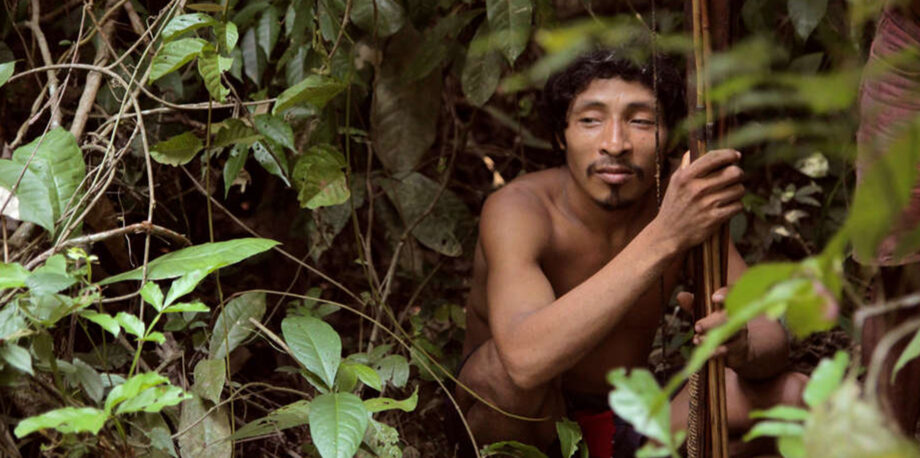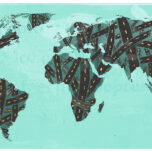March 4, 2019 — On October 28, 2018, Sarah Shenker was in the Brazilian Amazon visiting members of the Awa and Guajara tribes, which have called the rainforest home for millennia. On the same day, the nation elected Jair Bolsonaro its new president with 55 percent of the vote.
Shenker, a campaigner with indigenous-rights organization Survival International, said that despite Bolsonaro’s election being predicted for months, tribal members experienced the reality of it as a “shock.” Currently around 13 percent of Brazil is demarcated as indigenous reserves. Bolsonaro, who has been reported to have expressed disappointment that the Brazilian cavalry hadn’t been as efficient as the U.S. in exterminating Indians, pledged during his campaign to halt new reserves and attempt to abolish established ones. He also promised to open up the Amazonian rainforest to agriculture and industrial development.
Shenker says after the early emotions began to wear off, tribal groups began to speak of something else.
“The reaction that I felt around me was one of resistance, people coming together … and saying, ‘Okay, well, this is now the situation we’re faced with, what are we going to do about it?’”
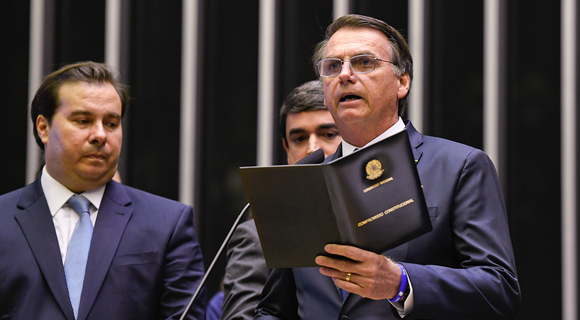
Brazilian president Jair Bolsonaro took office January 1, 2019. Photo courtesy of Edilson Rodrigues/Agência Senado, from Flickr, licensed under CC BY 2.0
It’s a question environmental and indigenous rights non-governmental organizations based in Brazil and around the world have been asking themselves as well: What do we do now?
Massive Impact
Hours after being sworn in on January 1, 2019, Bolsonaro signed an executive order that shifted the nation’s ability to create and regulate indigenous areas from the National Indian Foundation (FUNAI) to the agricultural ministry.
This may sound like just government shuffling, but observers say the move will have a massive impact. For more than 50 years, FUNAI had been charged with protecting Brazil’s 300-plus indigenous tribes — making up nearly 1 million people — and the forest they inhabit. Meanwhile, the agriculture ministry is seen as having a deep conflict of interest: It wants access to indigenous lands to expand Brazil’s powerful agroindustry. The executive order will stand for 120 days and then face a test in congress.
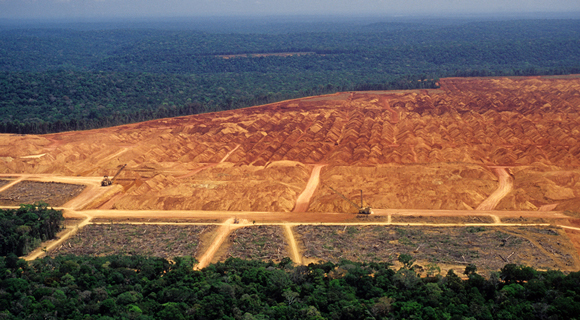
The Brazilian Amazon is threatened by a variety of types of development, including farming and mining. Photo © iStockphoto.com/luoman
Survival International, in a press release, called Bolsonaro’s order “virtually a declaration of open warfare.” The environmental impacts of this move could be far-flung. Scientists and officials increasingly view indigenous peoples among the best defenders of intact ecosystems, such as the Amazon rainforest. Research has shown that in some cases indigenous lands have less deforestation than strict protected areas such as national parks.
Throughout his campaign, Bolsonaro threatened to abolish certain indigenous reserves. More recently, his fledging administration has raised the possibility of having the agroindustry “rent” indigenous lands for farming.
Bolsonaro is backed by some of the most powerful political players in Brazil: the ruralista bloc. The ruralistas are a cadre of politicians often directly linked to big agriculture, including cattle and soy production, and wealthy landowners. They say that environmental regulations in the country, including a requirement to maintain a certain amount of land as natural, are too stringent and that agribusiness should be allowed to expand unrestricted.
Bolsonaro nominated Luiz Antonio Nabhan Garcia, the former head of the União Democrática Ruralista [Union of Democratic Ruralists] party as special secretary for Land Affairs at the Ministry of Agriculture.
Garcia has pledged to “clean up all land issues in Brazil.” This includes reexamining not only indigenous lands, but also those belonging to quilombolas, the descendants of runaway slaves, and lands granted to landless workers through land reform.
“Everything has to be analyzed with a neutral and exempt eye, without any kind of tendency, political or ideological link, without the interference of NGOs,” Garcia added.
Ruralista politicians contacted for comment did not respond.
Observers fear Bolsonaro’s rhetoric and policies will increase violence across the Amazonian regions. In January, Bolsonaro made it easier for Brazilians to buy and own guns. Meanwhile, Brazil is known as the deadliest place in the world for environmental defenders, according to Global Witness, a nonprofit organization that works at the intersection of conservation and human rights.
“His rhetoric is allowing the actors who already operate illegally in the Amazon — the loggers, miners and land grabbers — to operate with impunity. He’s sending signals that these actions will not only be allowed but rewarded,” says Christian Poirier, a program director with the nonprofit Amazon Watch.
Human rights and environmental organizations are also readying for a flood of new infrastructure in the Amazon, including the resurrection of controversial dam projects.The Brazilian government’s press office did not respond to request for comments about its plans for the Amazon rainforest or how it intends to work with indigenous groups.
Human rights and environmental organizations are also readying for a flood of new infrastructure in the Amazon, including the resurrection of controversial dam projects. Poirier says environmental groups expect the new congress to change laws to weaken environmental protections and “rubber stamp” the permitting process for dams, highways and mines.
Currently, the Brazilian constitution grants indigenous people rights to their traditional lands — but mapping and demarking them has taken time and has often been slowed by politicians (it was supposed to be done within five years of the 1988 constitution). If Bolsonaro decides to attempt to change this, he would need a three-fifths majority in both houses in order to succeed. So far, Bolsonaro has decided to target FUNAI instead of attempting an amendment.
“[It’s] the agribusiness lobby in Brazilian congress that has been really pushing for these changes in the Brazilian constitution to make it harder to protect indigenous land and … to open up existing territories,” says Shenker.
Shenker says her organization is concerned that the political shift could lead to the extinction of entire indigenous tribes, such as the Kawahiva. The Kawahiva, who may be down to “a few dozen” according to Shenker, live in Mato Grosso, the Brazilian state with the highest deforestation on record. The Kawahiva are under constant threat from regional violence and disease.
Beyond Brazil
Environmental impacts of Bolsonaro’s policies will likely extend beyond Brazil through an acceleration of climate change and biodiversity loss.
For 14 years, Brazil was a country that many pointed to as a model of how to better protect forests. Deforestation had dropped from over 25,000 square kilometers (about 10,000 square miles) in 2004 to less than 5,000 square kilometers (2,000 square miles) in 2012 — a remarkable turn around in eight years. Now the question is whether Brazil will go back to its previous ways.
During the three-month presidential campaign, deforestation jumped 50 percent when compared with the same period in 2017. Moreover from August 2017 to July 2018, people cut down 7,900 square kilometers (3,000 square miles) — an area larger than Delaware. Many view this rise as directly linked to the belief that environmental protections would be slashed under a Bolsonaro presidency.
The global impacts of rising deforestation are undeniable. Not only does the Amazon basin hold more species than any other ecosystem (10 percent of all known species), but it also stores 150 to 200 billion tons (140 to 180 billion metric tons) of carbon and produces its own weather.
NGOs’ Plans
Given the political winds battering the Amazon region, the big question lingers: How do environmentalists respond?
“I think indigenous groups and conservationists are very much in a ‘hunker down and pray’ mode,” says William Laurance, an ecologist at James Cook University, who compared this period to the 1980s and ’90s when Brazilian deforestation skyrocketed. “It’s time to dig in, draw lines in the sand, and get ready to battle the Bolsonaro onslaught, one mega-project at a time.”
Philip Fearnside, an ecologist at Brazil’s National Institute for Research in Amazonia (INPA), takes a slightly different approach. He says that while Bolsonaro does not listen to scientists, that doesn’t mean he’s completely unreachable. According to Fearnside, there are three segments of society to which Bolsonaro will bend his ear: the military, big agriculture and evangelical Christians.
“Although these groups of key supporters have obviously not given much priority to maintaining Amazon forest, they all have reason to question some of the [president’s] positions on the environment,” he says.
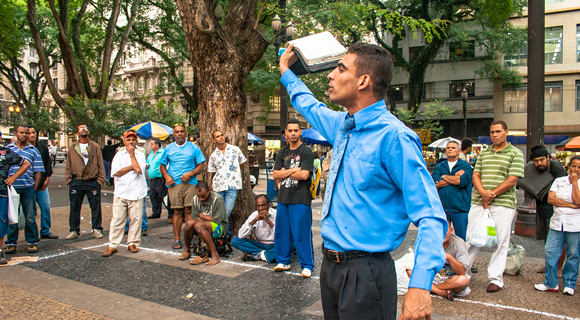
Some environmentalists suggest enlisting the support of evangelical Christians to protect the Amazon. Photo © iStockphoto.com/alffoto
Fearnside says the military should listen to security concerns regarding climate change. And agroindustry must maintain standing forests if it’s to ensure regional rainfall.
In March 2018 researchers predicted that leveling of 40 percent of the Amazon could lead to a tipping point whereby the vast majority shifts from rainforest to savanna. The drying of the region could have massive impacts on agriculture and rainfall.
“A large part of our economy is based on agriculture, which basically depends on climate equilibrium,” says Nilo D’Ávila, campaigns director for Greenpeace-Brazil.
As to evangelicals, Fearnside says an argument should be made that the destruction of the Amazon “is an affront to God’s creation.”
Another possible pressure point, according to numerous sources interviewed for this story, is to skirt Bolsonaro altogether and pressure the global corporations buying agricultural products from Brazil.“Messages about these concerns could penetrate Bolsonaro’s bubble if carried by the right intermediaries,” Fearnside says.
Another possible pressure point, according to numerous sources interviewed for this story, is to skirt Bolsonaro altogether and pressure the global corporations buying agricultural products from Brazil, which account for around half the nation’s exports, or those providing capital.
“No one wants to buy a hamburger that comes from Amazon deforestation,” says D’Ávila.
Amazon Watch executive director Leila Salazar-López made just this case in a recent op-ed in the New York Times, asking companies to make a “clear and principled stand.”
If Bolsonaro ignores environmental concerns, he will still “understand market signals,” says Poirier.
Laurance, an expert on global infrastructure’s impacts on the environment, suggests that activists keep an eye on China, which he says may be providing much of the funds for mega-projects in the Brazilian Amazon.
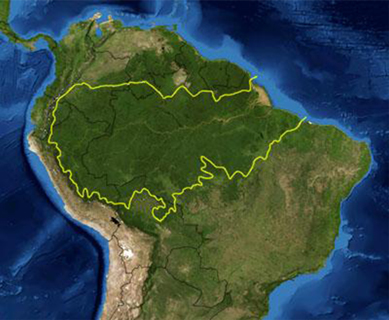
Almost two-thirds of the Amazon rainforest lies in Brazil, making this country a key focus for future protection efforts. Courtesy Wikimedia Commons
“Clearly [Bolsonaro] is taking his marching orders from those who want to exploit the Amazon for quick profits — most notably including China,” he says, adding, “Bolsonaro has found his perfect partner in Chinese investors and corporations that won’t blink at any environmental or social calamity.”
Another track those working to protect the Amazon under the Bolsonaro agenda plan to take is to focus on the Brazilian courts. For example, Shenker says Bolsonaro’s threats to eliminate indigenous reserves stands on precarious legal ground.
“Whatever Bolsonaro says and whatever he does, unless many laws have changed in Brazil, it will still be illegal to destroy indigenous peoples territories,“ says Shenker.
“The courts are going to be crucial under Bolsonaro to provide a check to his reckless agenda,” says Poirier, who adds that international groups can provide “financial support” for lawsuits.
The quilombolas have already brought legal action to the Supreme Court, demanding long-ignored land rights.
Bolsonaro has pledged not only to target the Amazon for exploitation, but also to go right for the very groups that lobby for its protection. He has threatened to expel environmental groups like Greenpeace and WWF. And he has signed an executive order allowing the government secretary to “supervise, coordinate, monitor and accompany” NGOs in the country. Ricardo Salles, the new environment minister, has also suspended all government partnerships with NGOs in the country for three months, a move that some called unconstitutional.
“We will create a broad and strong movement to defend the forest, inside and outside the country,” – Nilo D’ÁvilaA number of local conservationists declined to speak on the record, citing fear of government reprisal. But those that oppose Bolsonaros’ agenda are beginning to collaborate and plan, and are girding themselves for a long battle.
“We will create a broad and strong movement to defend the forest, inside and outside the country,” says D’Ávila. Indeed, the strongest defense against Bolsonaro’s policies may be coalition building.
Fearnside says environmentalists can’t just wait for the next administration in Brazil to tackle environmental issues.
“I believe it is important to do everything possible to improve the decisions of the [Bolsonaro] administration,” he says. ![]()
Related Posts
Ensia shares solutions-focused stories free of charge through our online magazine and partner media. That means audiences around the world have ready access to stories that can — and do — help them shape a better future. If you value our work, please show your support today.
Yes, I'll support Ensia!